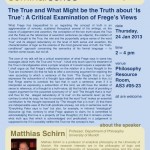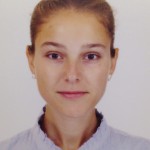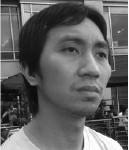 What Frege has bequeathed to us regarding the concept of truth is not a homogeneous, coherent and systematically worked out conception. It is rather an agglomeration of remarks, scattered throughout several of his writings, on the nature of judgement and assertion, the conception of the two truth-values the True and the False as the references of assertoric sentences (as objects), the relation of a (true) thought to the True, the role and the purportedly unique sense of the word “true” and its alleged redundancy on the level of both sense and assertion, the characterization of logic as the science of the most general laws of truth, the “truth-conditional“ approach concerning the semantics of his formal language — to mention some issues, but not all.
What Frege has bequeathed to us regarding the concept of truth is not a homogeneous, coherent and systematically worked out conception. It is rather an agglomeration of remarks, scattered throughout several of his writings, on the nature of judgement and assertion, the conception of the two truth-values the True and the False as the references of assertoric sentences (as objects), the relation of a (true) thought to the True, the role and the purportedly unique sense of the word “true” and its alleged redundancy on the level of both sense and assertion, the characterization of logic as the science of the most general laws of truth, the “truth-conditional“ approach concerning the semantics of his formal language — to mention some issues, but not all.
The core of my talk will be a critical examination of what Frege says in some key passages about truth, the True and “is true”. I shall only touch upon his treatment of the True in Grundgesetze since a proper analysis of it would require a separate talk. Where it seems useful and enlightening, aspects of the current discussion of the concept of truth (for example, the role of this concept in minimalism about truth) will be taken into account. I shall argue among other things (a) that Frege’s reflections on the relation of a (true) thought to the True are incoherent; (b) that he fails to offer a convincing argument for rejecting the view according to which a sentence of the form “The thought that p is true” expresses the subsumtion of a thought (qua object) under the concept is true; (c) that Frege seems to overlook the fact that in such a sentence, even if it is interpreted as expressing a subsumtion of this kind, we still have the relation of sense to reference, of a thought to a truth-value; (d) that he falls short of providing a cogent argument for the purported synonymy of “p” and “The thought that p is true” and thus for the alleged redundancy of “is true” on the semantic level; (e) that, contrary to what he says, he has to concede that the word “true” makes an essential contribution to the thought expressed by “The thought that p is true”; (f) that there are indispensable uses of the truth-predicate anyway, not only in sentences such as “Everything Peter says is true” but also, for example, in informal “metalogical” discourse (g) that, contrary to what Frege appears to claim, he is committed to acknowledging that true is a property (of true thoughts); (h) that it remains unclear what truth qua that which is acknowledged (not predicated) in a judgement is supposed to be if it is possibly neither the True nor the concept is true.
Philosophy Seminar Series.
Date: Thursday, 24 Jan 2013
Time: 2pm – 4pm
Venue: Philosophy Resource Room (AS3 #05-23)
Speaker: Matthias Schirn, Professor, Department of Philosophy, University of Munich
Moderator: Dr. Ben Blumson
About the Speaker:
 Mathias Schirn is a professor of analytical philosophy at the University of Munich. His research interests are in the philosophy of logic and mathematics, the philosophy of language, epistemology and the more recent history of philosophy and logic with particular emphasis on the work of Gottlob Frege.
Mathias Schirn is a professor of analytical philosophy at the University of Munich. His research interests are in the philosophy of logic and mathematics, the philosophy of language, epistemology and the more recent history of philosophy and logic with particular emphasis on the work of Gottlob Frege.
He held visiting positions at the universities of Oxford, Cambridge, Harvard, Berkeley, Minnesota (Twin Cities), Mexico City (UNAM), Buenos Aires, São Paulo and several other universities in Europe, the United States and Latin America.
He published in The Journal of Symbolic Logic, Mind, The Philosophical Review, Synthese, Erkenntnis, History and Philosophy of Logic, Logique et Analyse, The Bristish Journal for the Philosophy of Science, Metascience, Dialectica, Axiomathes, Kantstudien, Theoria, Crítica, Manuscrito and other international journals.
He published two books on the philosophy of language (one in German and one in Portuguese with Guido Imaguire), edited several books including Frege, Importance and Legacy, de Gruyter, Berlin New York, and The Philosophy of Mathematics Today, Oxford University Press, Oxford and he is now preparing a book with the title Foundations of Logic and Mathematics. Essays on Frege and another with the title Zahl und Begriff, Untersuchungen zu Freges Philosophie der Mathematik.
Among his hobbies are chamber music (especially string quartets), jazz, Roman languages, visits to Latin America and sports (especially bike racing competitions).
 Theresa Helke joined the department in August 2014. She is the first Philosophy PhD candidate in the NUS/Yale-NUS joint supervision programme. Before, she majored in Logic and minored in Government at Smith College. Professors Jay Garfield and James Henle supervised her honours thesis (‘Brown v. Brown: The Limits of Logic in Law and Language’). Professor Chris Mortensen (University of Adelaide) and she co-authored an article which the British Journal of Aesthetics published in 2013 (‘How Many Impossible Images Did Escher Produce?’, (2013) 53 (4): 425-441). After working at the Royal Institute of International Affairs (Chatham House) in London and travelling to India, Thailand, Australia, New Zealand and Papua New Guinea, she read Law at the University of Cambridge. Now, she is interested in multiculturalism and, within it, feminism, migration, law and linguistics. Professor Jay Garfield, who currently teaches at both NUS and Yale-NUS, is supervising her dissertation. She is English but grew up in New York City, Geneva and Vienna. Having trained eight years as a circus artist, she enjoys riding her unicycle.
Theresa Helke joined the department in August 2014. She is the first Philosophy PhD candidate in the NUS/Yale-NUS joint supervision programme. Before, she majored in Logic and minored in Government at Smith College. Professors Jay Garfield and James Henle supervised her honours thesis (‘Brown v. Brown: The Limits of Logic in Law and Language’). Professor Chris Mortensen (University of Adelaide) and she co-authored an article which the British Journal of Aesthetics published in 2013 (‘How Many Impossible Images Did Escher Produce?’, (2013) 53 (4): 425-441). After working at the Royal Institute of International Affairs (Chatham House) in London and travelling to India, Thailand, Australia, New Zealand and Papua New Guinea, she read Law at the University of Cambridge. Now, she is interested in multiculturalism and, within it, feminism, migration, law and linguistics. Professor Jay Garfield, who currently teaches at both NUS and Yale-NUS, is supervising her dissertation. She is English but grew up in New York City, Geneva and Vienna. Having trained eight years as a circus artist, she enjoys riding her unicycle.




 Robert James Boyles is a lecturer in philosophy at De La Salle University-Manila. He earned his Master in Philosophical Research from the same school.
Robert James Boyles is a lecturer in philosophy at De La Salle University-Manila. He earned his Master in Philosophical Research from the same school.